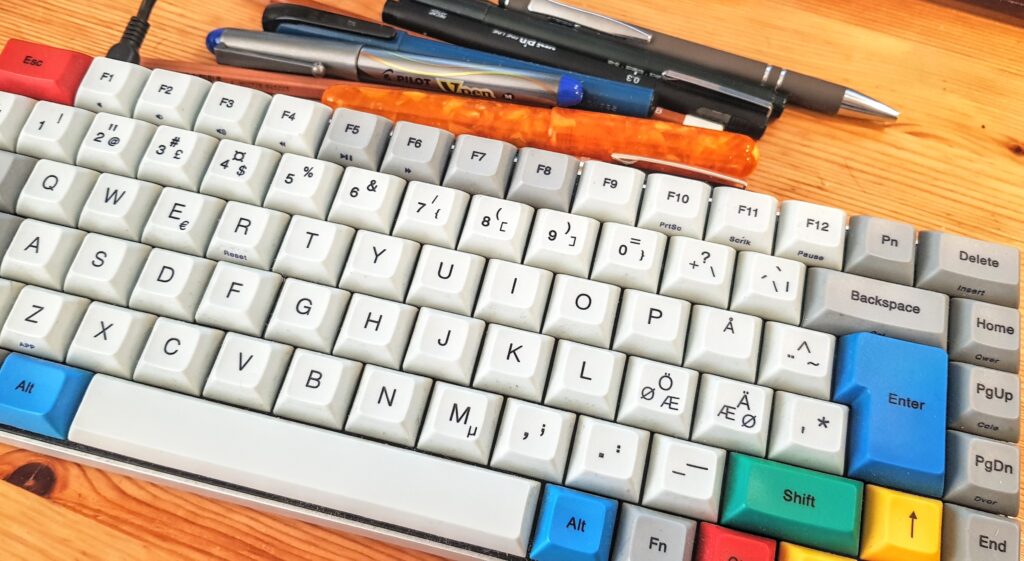
Why you should write by hand
Many people see handwriting as old fashioned, impractical and unnecessary. You can sometimes wonder why it’s still important to be able to write by hand, to be able to communicate and make yourself understood with handwriting, and to use handwriting to note things down for yourself. Why is this necessary in a society where we have smartphones and computers, Siri and Google Assistant?
For many, handwriting may seem cumbersome and slow, but part of the reason for that is precisely that they aren’t used to writing by hand. By training your handwriting, so it’s fast, effortless and readable, you also give yourself a very useful tool that can help when you have to learn something new, when you have to take notes, when you have to write a shopping list, or when you need to write something down quickly, and have no other options at hand than paper and pen.
The fact that many choose not to write by hand, or that many believe it’s better to write on a keyboard, can in many cases be due to the fact that people are simply much more comfortable with the keyboard than with the pen. We have a generation that has grown up with handheld gadgets and doodads that you can write on, or even just dictate to. They write fluently on keyboards and touch screens, but are way out of their comfort zone if they have to write with a pen or pencil. At the same time, writing by hand can have a positive effect in many areas that typing on a keyboard don’t.

11 reasons why you should write by hand:
1. The tactile
An essential part of being human is doing practical things with our hands. It stimulates our creativity. This is precisely what has led to our development as a species. If we stop creating things with our hands, we will lose a big part of ourselves. This of course applies to both handwriting and other crafts. Sitting in front of a screen and pressing a keyboard doesn’t have the same effect, and doesn’t stimulate us in the same way.
2. You process information better
You process the information better when you write by hand. When you type on a keyboard, you type much faster, and many people manage to basically transcribe what’s said word for word. Writing by hand is slower, you have to process the information and actively select what’s important to write down. It gives you a completely different focus in a meeting or a lecture. This active learning means that you also remember better what’s said.
3. You learn better
You activate a larger part of the brain by writing by hand. The movements the hand must make are more complex than when typing on a keyboard. The fact that you have to physically shape the letters and actively choose how the letters should look also activates the creative parts of the brain. Both the motor and the creative – both brain hemispheres – are in flux. When you activate more parts of the brain, you acquire knowledge in a better way.
4. You are more creative
As you activate a larger part of your brain when you write by hand, many researchers believe that you are also more creative. In other words, in a creative process it can often be a good idea to write with a pen or a pencil, rather than using a keyboard, for example when brainstorming. Think about this the next time you have to find out where to go on holiday this year, or you have to give a speech at a wedding, or you are given responsibility for a new project at work. Maybe it will do you good to start with paper and pencil.
5. Fewer distractions
There are fewer distractions in a notebook than there are on a computer screen. How many haven’t been in meetings or lectures with their laptop up, seen that an e-mail has ticked in, and then ended up reading it, or even replying to it, in the meeting? At least I’ve done it, and the result every single time is that things are said that I don’t get, because my mind is on the email I’m reading/replying to. We humans are much worse at multitasking than we think. We don’t catch things that are said at the same time as we read or write an e-mail. The only thing we achieve with it is to distract ourselves from what we’re actually supposed to do, which in turn contributes to a less effective meeting. I don’t experience this if I ditch the computer and only have pen and paper with me. Then I’m focused on what I have to do,
6. It trains fine motor skills
And we have use for fine motor skills in other contexts as well. Every time we use our hands and fingers for something, we are also using our fine motor skills. When we cook, when we knit, when we leaf through a book, when we tie our shoelaces, when we cut our nails and put on make-up. Yes, also when we type on the keyboard. Especially with young school children, handwriting is a very good way to train fine motor skills, and one of the first activities you do that requires extreme accuracy and precision work.

7. It makes us better at reading and writing
Research shows that handwriting helps us in areas such as reading comprehension, idea generation, spelling, cognitive development and memory, in a way that typing does not.
Some studies suggest that handwriting also helps people with dyslexia, as through handwriting you actually experience the physical difference between the various letters, while on a keyboard all the keys looks and feels the same.
8. It forces us to think more slowly
Writing by hand forces us to slow down, and also to think more slowly. In today’s society, where we are constantly bombarded with sensory impressions from all sides, this can be an advantage. Over the past couple of decades, our attention spans have shortened drastically. I notice it in myself as well. As a child I could entertain myself with a book for hour after hour, but now I start to get bored after reading for half an hour, no matter how exciting the book is. There’s just not enough stimuli in the book to hold my attention. The same applies when I watch TV. I get restless if I just sit and watch TV. Usually it’s combined with noodling around on the phone, or snacking. I know many others feel this way too.
My own attention span has gotten much shorter over the past 15-20 years, and it scares me. Handwriting is a means of counteracting that, retraining myself to slow down, and focus on one thing at a time. I think many people can benefit from that.
9. Your writing gets better
As handwriting is slower, people tend to choose their words more carefully. This means that the textual result is often of a higher quality, you have a more efficient language, and you get to say what needs to be said with fewer words.
10. It’s more personal
In a digital world, handwriting is a great way to dip into the human aspect of everyday life. It can be used as a break from the screen and the keyboard, which especially those of us who work in an office can greatly benefit from.
Handwriting is also more personal. A handwritten letter is much more fun to read than an email, but it doesn’t have to be a full letter either. When was the last time you sent someone a postcard? Or how about a small encouraging message on a post-it note to a colleague?
11. It gives us a bridge to the past
Humans have been writing by hand for thousands of years. It’s only in the last hundred years or so we’ve gotten other tools that have taken over a lot of it, and perhaps especially in the last thirty years. Writing by hand enables us to better understand those who came before us, how they worked, how they thought, and how they documented their experiences. Writing by hand ourselves makes us better able to read older handwritten texts.

Research shows time and time again that writing by hand can have many positive effects on learning and development, but at the same time there’s less and less focus on it in the school system. If you don’t teach children to write comfortably by hand, you also run the risk of robbing them of a potentially important study technique tool when they eventually reach upper secondary school and higher education. If they haven’t learned to use their handwriting by then, it may be too late in most cases. The foundation must be laid in primary school. In the worst case, you prevent them from becoming the best versions of themselves, and in a time where greater and greater demands are placed on people both during their studies and in working life, this is a scary development.
Ultimately, there are many advantages to both typing on a keyboard and writing by hand. Why not learn to do both fluently? Then you give yourself the opportunity to choose the methods that work best for you at any given time.